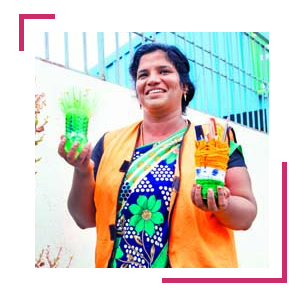
For a Better Tommorow
Bharat Petroleum Corporation Limited
"With a vision to “be a model corporate entity with social responsibility committed to energising lives through sustainable development”, Bharat Petroleum Corporation Ltd (BPCL) has a legacy of replicable and scalable projects"
Since its inception in 1886 as Burmah Oil Company, the company has reinvented itself many times. The pioneering spirit and the aim to be self-reliant can be seen in its CSR projects too. BPCL leverages its core competencies of people and technology to ‘develop deserving communities through ‘focused’ and ‘need-based’ interventions’. The thrust areas for CSR are water conservation, education, skill development, community development, health and hygiene.
The goal is to create a wholesome educational environment, focussed on the overall development of the child and to bridge the socio-economic divide. Initiatives such as Computer Assisted Learning, Digital Literacy & Life Skills, Science education, Civics education, Read India, Library for schools and Project for Higher Secondary dropouts have been helping lakhs of underprivileged children.
It’s evening and a group of children is sitting in Rani Sanjay Gavit’s verandah. This is a quiet village called Ajaypore in Nandurbar district, Maharashtra. This Accredited Social Health Acivist is a volunteer and her home is a centre of peer learning. With material supplied by the implementing partner, this Bal Library Intervention encourages learning in homely environment.
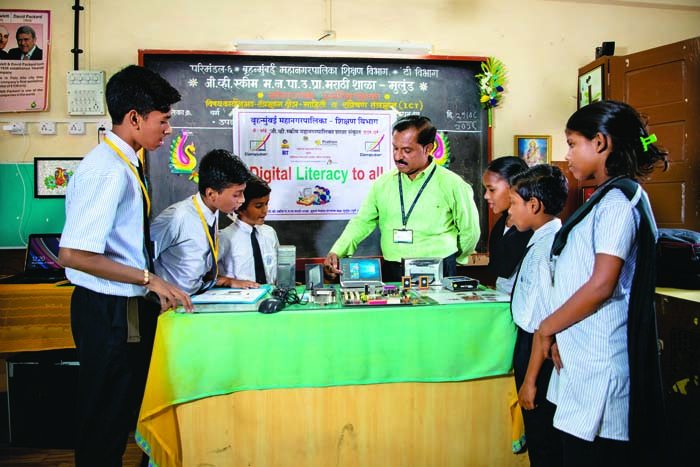
Under CAL,all the people involved are learners, as they get access to the latest technologies and methods
Project Akshar was born in 2010 to mainstream the remote habitants of Nandurbar in Maharashtra and Sagar in Madhya Pradesh. In both these regions, human habitation is spread across hamlets. With meagre earnings, men migrate in search of work, leaving the children and women behind. Being home to many tribals, the dialect varies in every hamlet. Commuting is also an issue and this leads to absence of teachers in the government schools. Spread across 1,059 villages, the project encompasses even the smallest of schools.
A survey revealed that most children never reach grade 5, as they are unable to read, write and comprehend. Thus, ‘Read India’ became the aim to build foundational skills in reading and arithmetic for students in standard III to V by moving beyond the traditional classroom model to more interactive learning. Each student's level was checked, and groups formed.
A massive human force comprising educational experts, government officials, school teachers, programme leaders, volunteers and parents came together in the form of committees. Government school teachers too were trained as interventions are held in the schools. The long-term goal is to enable children to read grade level content with ease, by the end of the project period (April 2020). Besides the interventions, 17 Gram Shiksha Kendras (GSK) have been created across the districts. These are common reading halls which are run and maintained by the villagers.In 2018-19, Project Akshar reached 48,595 children and 3,459 volunteers in Sagar. In Nandurbar, it reached 48,377 children and 1,472 volunteers. Around 3,726 teachers were trained.
Nine-year-old Ganesh is busy making a movie. He has been trained in ‘Movie Maker’ by his crafts teacher. The classroom of this government school in Mulund East, Mumbai, is buzzing. Some children are drawing pictures on ‘Paint’. Rohit is in standard 8 and he has been learning to use computer since he was in standard 3.
He is adept at ‘Scratch’. On good days, their teacher allows them to watch educational videos on YouTube, giving them an introduction on the ‘world wide web’. This doesn’t seem like an unusual scene in the times we live in, but for the fact that none of these children have access to a computer or smartphones in their homes. Their parents work as helpers or daily labourers and they live in the nearby slums. They are also a mixed lot, Mumbai being home to many migrants from Bihar, Gujarat, Uttar Pradesh. Their access to technology lies in this small classroom through the partners that BPCL has chosen.
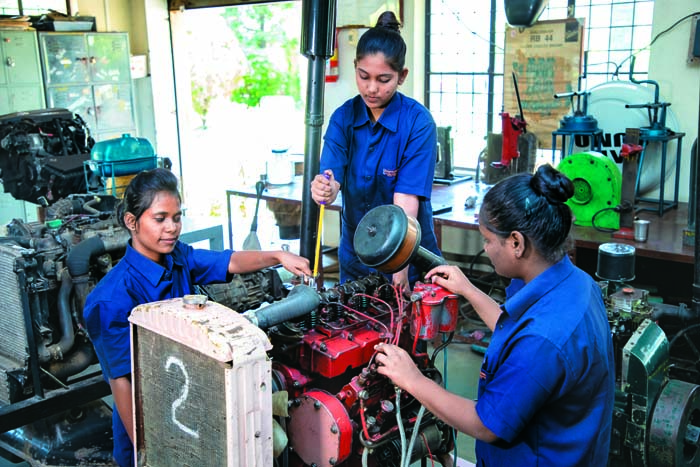
Livelihood opportunities for the young ones affected by the disease
In 2017, BPCL took up the project with the Municipal Corporation of Greater Mumbai (MCGM) to initiate Computer Aided Learning (CAL) and Digital Literacy as Life Skill (DLLS) programme in MCGM schools of Mumbai, Maharashtra. The aim: reach 50 government schools covering around 55,000 school children.
Keeping in mind the sustainability factor, the course is carried out by the school teachers and 80-100 school teachers were trained. BPCL upgraded the computers. The learning for the students is done gradewise, beginning with a year-long foundation course. By the end of the syllabus, the student is equipped in multi-media, coding and basic use of common softwares such as MS Office.
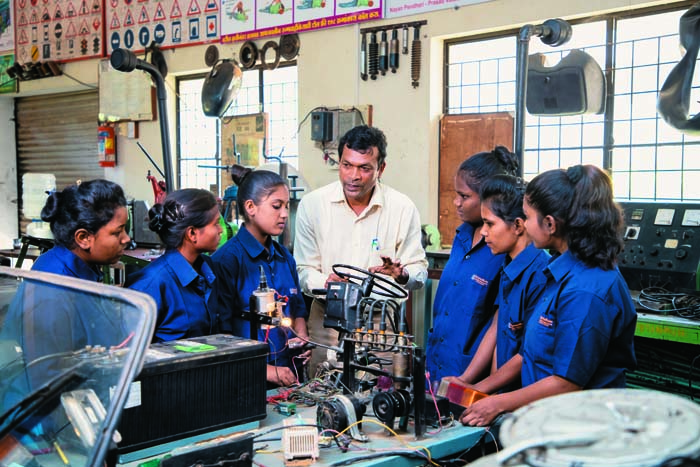
A class at the The Leprosy Mission Vocational Training Centre Nashik
Clad in their blue uniforms, the students are busy learning different skills at the Leprosy Mission’s Vocational Training Centre (VTC) in Nashik. Some are in the printing class, others are understanding welding and yet more are in a car workshop. It would have been just another skill development centre but for the fact that this caters mainly to those who have been affected by leprosy in some way—either the families have been affected or they have suffered themselves. Just their presence in a professional training course is a message that the disease is curable and if treated in the early stages, then it does not leave one with a disability. And this fulfills the aim of the ‘Partnership For Empowerment’ project which offers support for placement linked vocational training centres for leprosy affected and underprivileged youth.
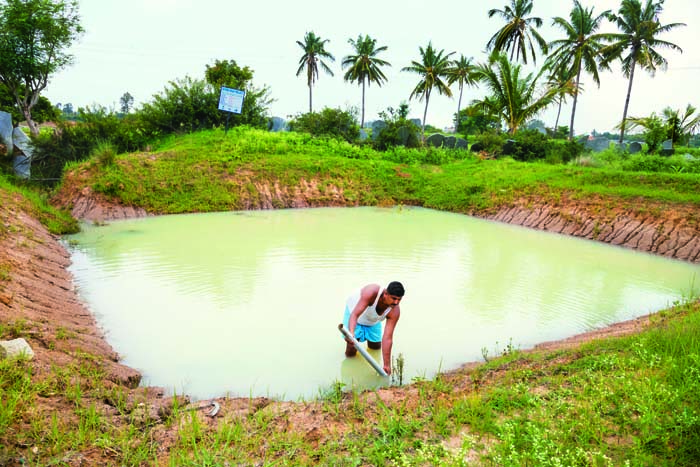
With a rejuvenated pond,farmers in Kolar region,Karnataka,have benefited immensely under Project Boond
Currently these VTCs are running in six states in India, namely Nashik in Maharashtra, Vizianagaram in Andhra Pradesh, Champa in Chhattisgarh, Vadathorasalur in Tamil Nadu, Bankura in West Bengal and Faizabad in Uttar Pradesh. The courses range from Welding, Motor Mechanic to Diesel Mechanic, Printing, Computer Operated Programme and more. Besides boarding and training, the students are counselled during the course too. They are taught basic English, behavioural issues are handled, and self-reliance is promoted. The principal, VTC Nashik, an engineer who left the corporate world to handle the centre, says, “Leprosy has long been a cause for discrimination, and the affected ones have taken refuge with others undergoing similar issues. The key to handling these cases is sensitivity, treatment, training and after-care.”
At 44, Anil Dikhale has made rehabilitating young ones his mission. From being a leprosy patient to getting trained at VTC Nashik and finally becoming a teacher there, his journey is an inspiration. His parents died while he was a small child and he lived with his paternal grandmother. She was diagnosed with leprosy and sent to the mission in Poladpur. “The panchayat also sent me with her. I didn’t have it earlier but then I also got it. I hid it for sometime. Eventually in 1982, my hands became clawed and I was also treated at Amravati district hospital. There a doctor suggested I get trained. And I reached Nashik, got trained and the principal offered me a teaching job here,” he says. Dikhale got a scholarship in the fourth standard, topping in district Poladpur. He was good at sports too and still plays volleyball and cricket.
The centre runs like any educational institution with four houses, a library, cultural programmes, games and alumni who motivate the newbies. And the placement is 100 per cent. Dhammadas Shivadas Jamnik is now a diesel mechanic.
Mayur Ajamoddin Pinjari did a welding course and works with a multinational car manufacturing company in Jalgaon. S. Subhashish is employed with an automotive manufacturing company. Arvind is a superintendent; Amar Suresh Muttalkar is a mediclaim policy assistant. Almost 700 students are trained in these institutions. The Leprosy Mission also runs community-based training related to tailoring, a beautician course, etc.
Seeing the green world around Kolar region in Karnataka, it’s difficult to understand that water is a rare commodity here. With ground water level going to 1,600-2,000 ft, most people are dependent on bore wells (which also deplete water) and women have a tough time coping with household needs. But it’s the efforts under this project to harvest rain water in many ways and increase ground water levels that keep the farmers here thriving. Elucidating on the work, the implementing partners say that the region has seen an upsurge in income and better quality of life with the construction of farm ponds, tank rehabilitation, mini percolation tanks, check dams, vermi-compost pits and individual roof water harvesting units.
Farmers are now involved in dairy and fishery. They now grow fruits such as mangoes and pomegranates, even mulberry. Silk production has gone up with sericulture. The region is also popular for horticulture and fields of marigold and roses are common. Vegetables such as tomatoes, potatoes and cauliflower are also grown.
With his new farm pond, Amar Nath Singh’s two acres in Jadipur village, Malur Block in Kolar, Karnataka, get ample water. This farmer is now able to grow three to four crops as there is water the year through. His fields are always green with ragi, rice and jawar.
And 32-year-old Srinivas is equally happy as he able to grow more marigolds and roses now, thanks to the pond and the vermi-compost pit that he was helped with. Chaitra studies in standard IX and along with her friend Sriknaya, she uses the village pond near Bettagerahalli for washing clothes. The bund was revived and three villages use this water now.
And this is just one drop in the ocean for Project Boond, which has been implemented in Maharashtra, Tamil Nadu, Rajasthan, Andhra Pradesh and Uttar Pradesh as well. The journey of this project began with four villages in Maharashtra which fell in the rain shadow region behind the Western Ghats and along BPCL’s product line. Despite receiving ample rainfall during the monsoon (average annual rainfall is 2100 mm), by February/ March they were all dry. To help with drinking water during the scarce months, rain water harvesting was done through indigenous structures such as construction of underground bunds, KT weir dams and gabions with village participation. Repairs and deepening of wells by desilting was also undertaken.
A survey was conducted to study regions with low ground water levels, where droughts were common, agriculture was suffering and there was lack of drinking water facilities. With the concept of ‘shramdan’ by the community, the project has converted more than 230 villages from ‘water scarce’ to ‘water positive’. This community participation ensures sustainability. The villagers are involved from the planning stage and contribute 25 per cent of the expenses. Small and marginal farmers are the major beneficiaries.
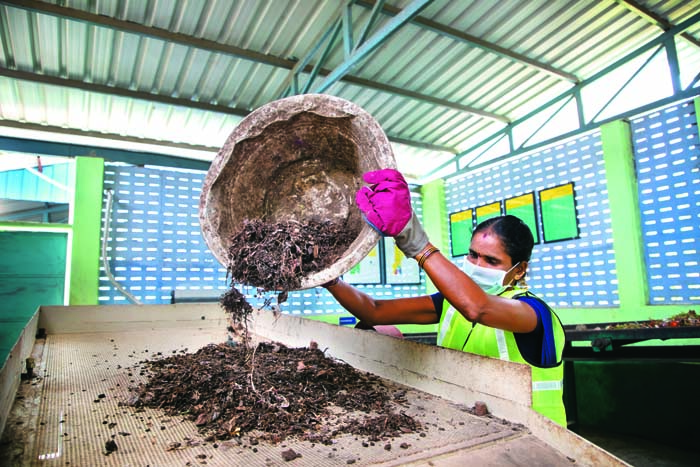
Food waste becomes organic manure at the solid waste mangement centre in Avadi,Chennai
Rapid urbanisation around Chennai brought its own set of issues. When a survey was conducted, the garbage collected from the three municipalities of Avadi, Poonamallee and Thiruverkadu,roughly 228 MT, was being dumped in a yard (approx. 17 acres) in Sekkadu village. The municipality dumping grounds were overloaded. This menace was resulting in sanitation/health risks and ground water pollution. Besides, there was the heavy cost of fleet and workers for collection, transportation and dumping.
When the office of the Commissioner of Municipal Administration, Tamil Nadu, approached BPCL for support, the company agreed to set up micro-composting plants. There are 33 units across three municipalities in Chennai—17 in Avadi, 6 in Poonamallee and the rest in Thiruverkadu.
Absolutely clean with no stench or flies, the micro-compost plants are an education in hygiene too. While four women from the underprivileged section turn the solid waste into organic manure, an army of workers collects the waste from the homes. It takes 42 days to make one lot of manure. Only natural ingredients like curd, jaggery, water, rice husk are used. The organic manure is then sold in the neighbourhood and to institutions. And the money from the sale is distributed among the women who work at the centre.
The model offers stable income and hygienic environs. There is reduction in dumping of waste, fuel consumption and carbon footprint. The project started with 19 units and was scaled up by adding 14 units. It now covers 56 wards with a population of over four lakh people. The cost was Rs 10.96 crore. BPCL extended support of Rs 6.05 crore to Avadi Municipality, Rs 2.91 crore to Poonamallee Municipality and Rs 2 crore to Thiruverkadu and there are many happy homes.
With its multiple projects, BPCL is energising lives and contributing wholeheartedly to a prosperous society. Building a nation with a sound educational base through CAL and Project Akshar, skilling youth for livelihood opportunities by supporting vocational training centres, helping conserve water through the revolutionary Project Boond and pushing the way for good waste management practices, the company is on the path to developing harmonious communities.
Anil Dikhale, Teacher
VTC, Nashik
Cured of leprosy, he has a gung-ho atttitude.
"People hide their clawed hands
in their pocket. But we should not be ashamed and live our dreams and not hide
our disability."
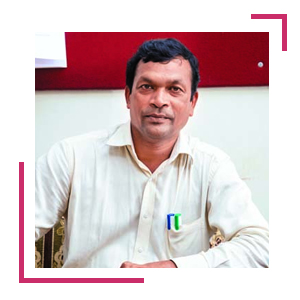
D. Kaviyarasi, Waste management worker
Veeraragavapuram Burial Ground (East Side),Thiruverkadu, Chennai
The bright 26-year-old is an eco warrior with love for hygiene.
"I like making
awareness posters related to air pollution, saving water and not using plastic
as it is harmful for the environment."
